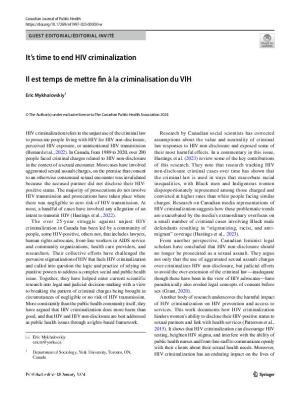Il est temps de mettre fin à la criminalisation du VIH
Quelques fonctionnaires de la santé publique ont appuyé les efforts pour réformer la criminalisation du VIH, mais la contribution de la profession de la santé publique organisée a été marginale dans l’ensemble. Les autorités de santé publique ont été indifférentes à ces efforts, ont eu peur d’exprimer leur appui ou se sont activement opposées aux changements nécessaires. Cet article affirme qu'il n’est pas trop tard pour la communauté de la santé publique de changer les choses. Il faudra beaucoup de travail et de plaidoyers soutenus pour inverser complètement le courant en matière de criminalisation du VIH au pays. Si la santé publique exhortait fermement le gouvernement fédéral à respecter sa promesse d’instaurer des réformes raisonnées et factuelles du Code criminel pour mettre fin à la criminalisation injuste du VIH, elle apporterait une contribution majeure.

